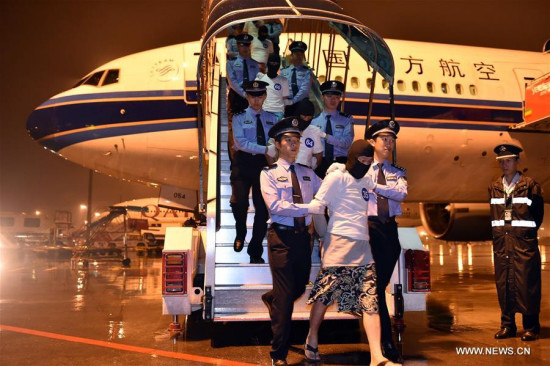
Chinese telecom fraud suspects are escorted off an aircraft by the police at Guangzhou Baiyun International Airport in Guangzhou, capital of south China's Guangdong Province, April 30, 2016. (Photo: Xinhua/Liang Xu)
The deportation of 32 Taiwanese telecom fraud suspects from Malaysia to the Chinese mainland on Saturday complies with the international law and will help better fight crimes, experts have said.
A total of 97 suspects implicated in more than 100 major telecom fraud cases across the mainland, were repatriated, including 32 from Taiwan. All the victims of the fraud trap are mainland residents.
Wherever the criminals are, the mainland has territorial jurisdiction over these cases as the results of the fraud happened on the mainland, said Li Juqian, deputy head of the International Law School under China University of Political Science and Law (CUPL).
"It is in accordance with the international and mainland law that Malaysia deported the suspects to the mainland. The move is unchallengeable in terms of law," Li said.
China's law enforcement agencies have cooperated with their counterparts in countries like the Philippines, Malaysia and Indonesia in cracking down on telecom frauds since 2011, according to Ma Chengyuan, a law professor with the CUPL.
Given diplomatic relations and extradition treaties that China established and inked with these countries, as well as criminal justice pacts signed with some of them, China can cooperate with them if crimes are committed there, no matter suspects are from the mainland or Taiwan, Ma said.
In late March, Malaysian and Chinese mainland police cooperated in destroying five telecom fraud dens located in Malaysia, and nabbed 117 Chinese suspects, including 65 from the mainland and 52 from Taiwan.
Among those from Taiwan, 20 were transferred to Taiwan authorities on April 15. The mainland government requested Malaysia to transfer the rest of the suspects to the mainland.
The mainland used to transfer Taiwanese suspects to Taiwan, which was in compliance with the relevant cross-Strait agreement and no more than an internal division of work, Ma said.
As stipulated by the mainland's Criminal Law, the mainland enjoys territorial jurisdiction over telecom fraud cases based overseas and targeting mainland legal persons and residents, as the results happen on the mainland.
Considering the comparative lighter punishment that telecom swindlers face in Taiwan, experts said, repatriating Taiwanese suspects to the mainland and trying them according to mainland laws will help better fight crimes and protect legitimate rights and interests of people across the Strait.
Telecom frauds could face a maximum prison sentence of five years in Taiwan, while the maximum is life sentence on the mainland, said Fan Chongyi, professor from the CUPL's Procedural Law Research Institute.
"Telecom fraud has been on the rise and done great harm to the interests of mainland legal persons and residents. Suspects who were sent back to Taiwan were given lenient sentences or even acquitted. Many of them later resumed swindling," Fan said.
Malaysia deported the suspects to the mainland "solely for the need to fight crimes," law expert Chen Jingtian said. "It is completely unnecessary to politicize the move."
The 97 repatriated suspects are now being held at a detention center in the southern city of Zhuhai, according to Zhang Jun, a senior investigator from the Ministry of Public Security.
Sending the suspects back to the mainland will help the police obtain evidence and investigate thoroughly into the case, Zhang said.
In a telecom fraud syndicate, roles are clearly divided, with members posing as postal clerks, delivery persons, telecom company employees, police officers or prosecutors.
"Some members are tasked with recruiting, maintenance support or acquiring information of victims," Zhang said.
It will be very difficult to find out how the syndicate is structured and fraud is committed if interrogation is not conducted at a same place, Zhang noted.
Repatriating all the suspects to the mainland will help form a chain of evidence, Zhang said, as the investigation and obtaining of evidence need to take place primarily on the mainland, with the evidence to be crosschecked with statements of the suspects and victims.
Moreover, criminals could face harsher penalty on the mainland than in Taiwan and thus be deterred from repeating crimes, Zhang stressed.
Taiwan laws impose lighter punishment on telecom fraud, thus making it a lucrative business and encouraging more to participate, according to Zhang.
The main reason that a Taiwanese surnamed Hsu, who is one of the telecom fraud suspects deported from Kenya to the Chinese mainland earlier in April, said the main reason that he could not quit telecom swindle is that "money comes easy and punishment is light."
"If I could have known I would be deported to mainland this time, I would definitely be too afraid to do this [swindle]," said Hsu, who was sentenced to seven months in prison the first time he was caught by Taiwan authorities.
"If Taiwan imposed harsh penalties, telecom fraud would not be so rampant in Taiwan," said another Taiwanese suspect, surnamed Lin, deported from Kenya.


















































